 Petzlover
Petzlover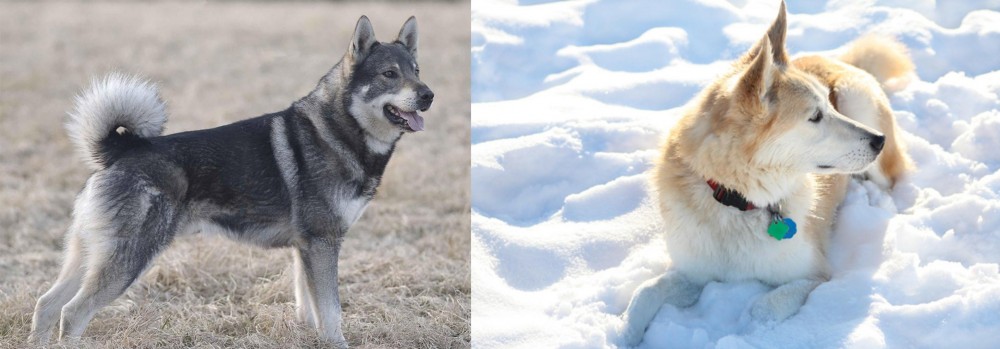 Jamthund is originated from Sweden but Labrador Husky is originated from Canada. Jamthund may grow 6 cm / 2 inches shorter than Labrador Husky. Jamthund may weigh 10 kg / 22 pounds lesser than Labrador Husky. Both Jamthund and Labrador Husky has same life span. Both Jamthund and Labrador Husky has almost same litter size. Both Jamthund and Labrador Husky requires Moderate Maintenance.
Jamthund is originated from Sweden but Labrador Husky is originated from Canada. Jamthund may grow 6 cm / 2 inches shorter than Labrador Husky. Jamthund may weigh 10 kg / 22 pounds lesser than Labrador Husky. Both Jamthund and Labrador Husky has same life span. Both Jamthund and Labrador Husky has almost same litter size. Both Jamthund and Labrador Husky requires Moderate Maintenance.
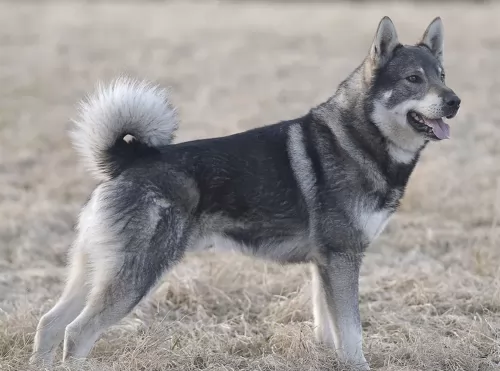 Known also as the Swedish Elkhound or Swedish Moosehound, the Jämthund is a dog which hails from Sweden, and more specifically from a region known as Jamtland.
Known also as the Swedish Elkhound or Swedish Moosehound, the Jämthund is a dog which hails from Sweden, and more specifically from a region known as Jamtland.
The dog received official recognition in 1946 as a dog breed from the Swedish Kennel Club. DNA testing tell us that these dogs originated from the crossing of a wolf, being described as a ‘Spitz-type dog’.
They were once used to pull sleds, and its why today he is an energetic dog, requiring a good dose of exercise and activities from his owners. The UKC accepted the dog as an official breed in 2006.
 The Labrador Husky is a purebred, spitz-type dog which looks much like a Wolf. People think because it has the name Labrador Husky it is a cross between a Husky and Labrador. What it essentially means is that it is a Husky dog which comes from the region of Labrador, Canada.
The Labrador Husky is a purebred, spitz-type dog which looks much like a Wolf. People think because it has the name Labrador Husky it is a cross between a Husky and Labrador. What it essentially means is that it is a Husky dog which comes from the region of Labrador, Canada.
It is a fairly unknown breed, but it is strongly believed that the dog was developed in Labrador, a region of northern Canada. In fact this is where the dog got its name from.
The attractive dog was used for sledding and it is also thought that the people of Labrador introduced Alaskan Malamute and German Shepherd in to add in some additional skills from these two dog breeds. The dogs were later domesticated so as to become companion animals.
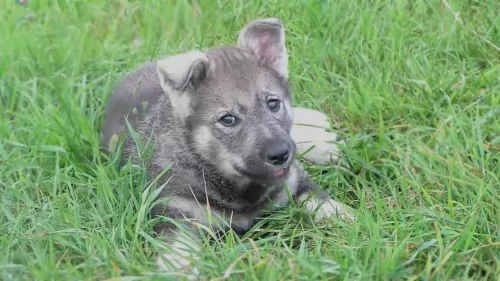 Described as a medium to large sized dog, the Jamthund stands at about 52 – 65cm in height, both males and females, and they weigh in at about 25 to 35 kilograms.
Described as a medium to large sized dog, the Jamthund stands at about 52 – 65cm in height, both males and females, and they weigh in at about 25 to 35 kilograms.
They have that typical Spitz-dog tail which curls over the back of the dog. When relaxed the tail hangs straight down. He has erect ears with a longish muzzle, much like a wolf, and his double coat lies fairly close to the body while on certain areas of the body, such as around the neck and tail, it is longer.
The color of his coat is usually light or dark grey with some cream marking around the muzzle, eyes, legs and paws. This fairly large, Spitz-type dog is certainly an attractive dog that while looking similar to a wolf shares some physical features with the Norwegian Elkhound.
Capable of being a splendid family pet, the Jamthund is an affectionate, loyal dog with his human family, although it is true that some of him hankers back to his hunting days.
He is an intelligent, amicable dog, and therefore training and socializing him is easy as he wants to please.
He is very energetic and won't be content with a life curled up indoors. He wants to be busy and involved with all your activities such as walks, hikes and swimming. He has a thick coat and he loves wintry weather, so the cold won’t stop him from wanting a long walk every day.
 The wolf-like muscular Labrador Husky is a large dog standing at 51 to 71 cm in height and weighing 27 to 45 kg.
The wolf-like muscular Labrador Husky is a large dog standing at 51 to 71 cm in height and weighing 27 to 45 kg.
Labrador is a place known for its icy winters and the dog’s double coat protects it from the freezing temperatures.
The color of the coat can be white, grey and white, solid black, solid grey as well as red and white. In fact there can be several different coat colors in one litter.
He has a long muzzle like the wolf and blue or brown slanted eyes. Sometimes you’ll get one blue eye and one brown eye. He has pointed ears, a nose which can be black or a pinkish color, bushy tail and paws which are webbed.
Labrador Huskies make wonderful pets and they are good with children, particularly when they’ve been properly trained and socialized.
Because they are dogs which have worked in a pack, they also get on well with other dogs in the home. You’ll notice that your Labrador Husky won’t often bark but he will howl like a wolf.
He is a friendly dog and not aggressive. He is intelligent too and you can teach him some basic commands such as sit, stay and lie-down.
The Labrador Husky is a dog used to having a job so if you bring him into your home, you’ll need to ensure that you set aside time to exercise him as he will become frustrated and bored if he isn’t involved in your family life.
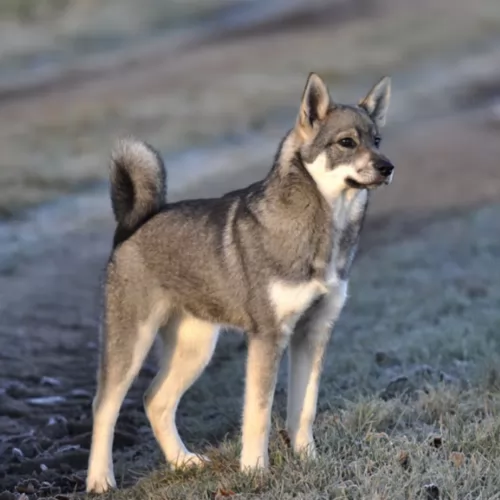 Loving the company of his human family, the Jamthund gets lonely, bored and frustrated if he is put into the backyard as a watchdog and left. When he becomes naughty it is because he is trying to tell you that he wants to be part of your life.
Loving the company of his human family, the Jamthund gets lonely, bored and frustrated if he is put into the backyard as a watchdog and left. When he becomes naughty it is because he is trying to tell you that he wants to be part of your life.
The Jämthund has excellent hunting skills and with his great intelligence too and his ability to learn easily, he makes a popular pet. He also has other attractive characteristics such as being brave and calm.
He forms a deep bond with his human family and his gentle nature makes him a favorite playmate of children too. They make good guard dogs as they are alert and protective of their human family.
Not only has the Jamthund got many positive characteristics to his name, he is an attractive dog too, and once you've brought one into your home you'll realize what a wonderful dimension it brings into your home and your life.
 A Labrador Husky is a loyal, affectionate dog who is capable of forming a strong bond with his human family.
A Labrador Husky is a loyal, affectionate dog who is capable of forming a strong bond with his human family.
As a working dog, he loves being busy with fun and games and is playful and energetic and has good looks on his side too.
He is also an intelligent dog, strong-willed and confident and will require a firm, consistent owner who understands his need for regular exercise.
Social, lively and robust, the right environment will bring out all this beautiful dog’s best characteristics.
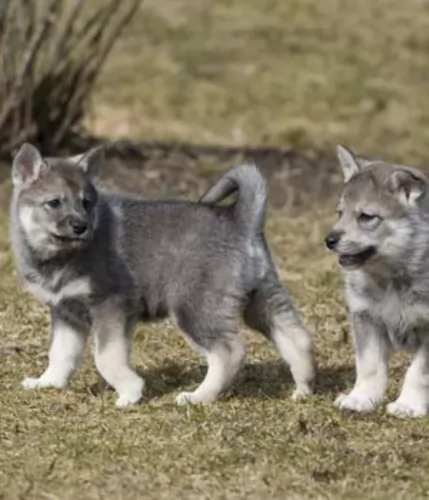 While the Jämthund is a healthy dog breed and won't cost you much in veterinary bills when it comes to illness, there are some common dog illnesses that are worth knowing about so you can respond in time to his need.
While the Jämthund is a healthy dog breed and won't cost you much in veterinary bills when it comes to illness, there are some common dog illnesses that are worth knowing about so you can respond in time to his need.
Unfortunately this is a joint problem that can affect even young dogs. The hip joint hasn't formed properly and it can lead to the development of painful arthritis. It can be a debilitating disease for your dog and you will need to see your vet.
This may seem like a trivial kind of dog illness but in fact it can lead to a lot of frustration, pain, anguish and discomfort for your pet. Signs of a skin allergy can include red, inflamed skin, itchiness, pain and oozing sores where your pet licks away miserably at the affected areas.
 Labrador Huskies can live to be between 10 and 13 years of age, and within a loving home he is generally looked upon as a healthy breed.
Labrador Huskies can live to be between 10 and 13 years of age, and within a loving home he is generally looked upon as a healthy breed.
There are always typical dog problems that might be found in your dog, and a couple of the more prominent ones are listed -
It can be a sad day for your Labrador Husky if he is diagnosed with hip dysplasia because if he is still used as a pack dog for pulling sleds it could well put him out of a job that he thrives on. It is a problem in the hips, and your once active dog may be in pain and may even battle to stand up after lying down.
He could even develop arthritis which can cripple him. He’ll need to get to the vet so that treatment can make life comfortable for him and to assist with pain.
Deep chested dogs are more prone to bloat, and your Labrador Husky is a deep chested dog. The stomach of the dog expands with gas, blocking gas escaping and putting pressure on the abdominal organs of the dog.
In some cases the stomach can twist and then immediate surgery will be required. This is a life threatening illness. Try and avoid feeding your dog one large meal and feed him smaller meals instead. These days you also get feeding bowls that encourage slower eating.
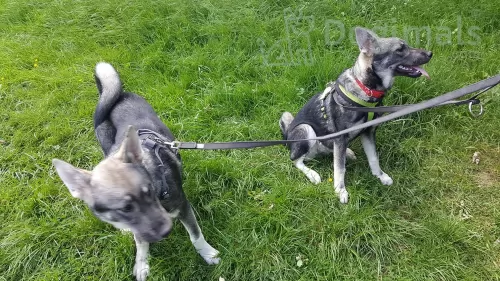 Your Jamthund is a high energy dog and because of his background of hunting and pulling sleds, he loves wide open spaces where he can run. He essentially suits country life and it wouldn't be wise to confine this energetic dog to a small home.
Your Jamthund is a high energy dog and because of his background of hunting and pulling sleds, he loves wide open spaces where he can run. He essentially suits country life and it wouldn't be wise to confine this energetic dog to a small home.
Brushing the thick coat twice a week will keep it in top condition.Keep his nails trimmed and also keep an eye on his teeth. Find out how to make use of canine toothbrush and toothpaste to keep his teeth clean and free of plaque.
Such a high energy dog requires the very best food packed full of vitamins and minerals. Look for the best commercially manufactured food there is and add in some wholesome home-made food from time to time such as cooked chicken, rice and vegetables as well as some raw meat occasionally. He must have a constant supply of fresh, cool water.
 You’ll want to introduce a proper grooming routine for your pet as he has a thick double coat and he sheds throughout the year. Brush the thick coat 2 or 3 times a week, and set aside time to check for fleas and ticks and any appearance of lumps.
You’ll want to introduce a proper grooming routine for your pet as he has a thick double coat and he sheds throughout the year. Brush the thick coat 2 or 3 times a week, and set aside time to check for fleas and ticks and any appearance of lumps.
These are dogs which require a lot of vigorous exercise. Left chained or ignored he can become frustrated, run-down, bored and sick. He is a living, social animal that should only be brought into a household that acts responsibly towards him.
Choose high quality food which is for high energy dogs. If you give him dry kibble, mix in some home-made food occasionally to add variety, and also try to include some raw meat from time to time. Always ensure fresh, cool water is available.